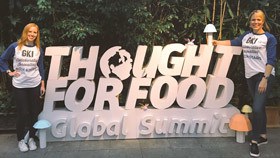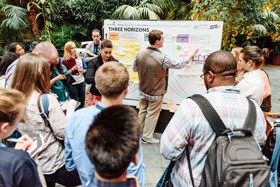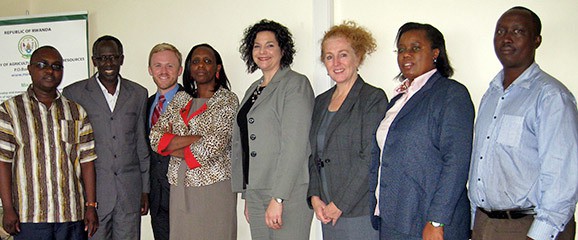GKI Facilitates a Global Network Innovating for Food Security
“Feed 9 billion people by 2050.” That was the invitation extended — our opportunity and our challenge — at the Thought for Food Global Summit. And who better to attempt to crack this behemoth problem than 300 creative and committed young entrepreneurs representing 100 countries? Putting method and an exciting structure to this challenge, the Global Knowledge Initiative (GKI) was privileged to facilitate the Summit’s plenary event.

Not your average conference
As the Huffington Post described it, the Thought for Food Global Summit is a mash-up between innovation hackathon, rock concert, and start-up competition, but with sportsmanship between global teams so striking journalist Pedro Rodriguez called it“required viewing for Presidential candidates.”
Upon approaching the Summit venue it’s clear: this is not your typical convening. The Thought for Food (TFF) Global Summit makes for a dreamlike experience. Convened at Giardino Verde (Green Garden) on the outskirts of Zurich, upon arriving we were immediately transported into a rainforest with towering palm trees, large glowing mushrooms, and origami bugs floating through the air. Participants tumbled into an innovation mindset against this Alice in Wonderland-esque backdrop. Provocative ideas pulsed through our brains like the electronic dance music from the morning rave…and suddenly, our imaginations were unleashed. We were off on a nonstop 2-day journey that would challenge and inspire us in equal measure.
The tale of tomorrows: mapping pathways to a food secure future
Key to translating the ideas of 300 young visionaries into coherent roadmaps is a process of sensemaking. Through months of exploration and design with Thought for Food’s executive team, GKI agreed to develop and facilitate a plenary session that would make visible and shareable Summit participants’ wide range ideas for a food secure future – or, more accurately, futures. Using a futures-foresight tool honed and deployed in a variety of settings by GKI, called “Three Horizons,” the GKI team constructed a three-hour experience that helped groups imagine and then deepen their ideas for multiple versions of a food secure future. The experience ushered participants through a rapid and simple process of mapping out “Innovation Journeys” that would transport us from the present to various ideal futures in which food security is assured.

Specifically, the Three Horizons tool helped participants (1) unpack 7 key challenges related to global food security such as hacking biology and boosting nutrition; (2) identify distinct visions of the ideal future in the year 2050, in which no one goes hungry; and (3) generate innovation-packed journeys to arrive at those ideal futures.
Led by GKI’s Sara Farley and Katie Bowman, Global Knowledge Initiative-trained “Thought for Food Ambassadors” co-facilitated this interactive tool. In less than three hours, seven groups produced over 3,000 sticky notes, each teeming with innovative ideas ranging from lab meat grown in kitchen kettles to nanotechnology for plant analysis to 3D food printing and more. Not only did the Three Horizons tool push participants to come up with big, bold, often “crazy” ideas for the future of food security, but it also demonstrated how those ideas could indeed become a reality.
Emergent themes on innovations in food security
Eliciting action and clarity of vision from groups is just one dimension of GKI’s facilitation practice, however. Networks take action once members see alignment between incentives. Achieving this often takes analysis and synthesis. Following the three-hour Three Horizons session, the GKI team jumped into analyzing the contents of each and every sticky note. Through the night the team reviewed and consolidated the data and sifted it to distill emerging themes, identify connections between ideas, and highlight big ideas. Working together with artist Elco van Staveren, GKI developed a keynote speech that Sara Farley offered the next morning to the crowd of Summit participants. The results were exciting! Though the 7 groups focused on unique facets of the Food Security challenge (e.g., Growing innovations; Sustainable business; Hacking biology; Empowering the crowd; Potential in open data; Natural resources and climate change; and Nutrition and health) nine cross-cutting themes emerged as essential ingredients that cut across the top solutions to feeding 9 billion people by the year 2050:

- Consciousness: Growing our collective consciousness regarding the importance of access to nutrition-rich food is imperative. We must first alter our mindset before we can alter our norms and processes.
- New Frontiers: We must take advantage of the sky, the sea, and outer space to grow food through vertical farming, aquaculture, and beyond.
- Global Coordination: In an increasingly interconnected world we can easily share data, ideas, and resources for food security.
- Share Economy: Streamlining communication and resource sharing to distribute food to those who need it most can magnify the impact of our efforts to combat food loss and food waste.
- Premium on Access: Data, education, technology, and research are imperative for achieving food security for all. We have the right pieces; they just aren’t reaching the right people.
- Human-Planetary Relations: We need to adapt and develop innovative responses to an ever-changing climate and increasing depletion of resources.
- Information Availability: With more information comes more power to make better decisions. Using sensors, nanotechnology, and more, people in poor, or remote areas can have information at their fingertips to maximize food production with minimal resources.
- Education: By improving and mainstreaming quality education, we can change the perception of sustainability, of science, and of the importance of food security.
- Engaged Business: We need to encourage businesses to reach a triple bottom line of improved profit, people, and planet if we are going to feed a world of 9 billion people.

Whether it’s a genetically engineered conscience or drones distributing food, the ideas emerging on how we might achieve our goal of a food secure planet by 2050 were provocative and powerful. An extremely important element of this conversation was the emphasis on action. The participants in the room were not just brilliant thinkers; they were also practitioners. Each year, a small group of these entrepreneurs makes its way to the final round of the Thought for Food competition and is invited to pitch their innovations to a panel of judges, a role played by GKI’s Sara Farley in 2015. The winner is given funding to develop and test their ideas. The 2016 TFF winning team—Kulisha—produces low-cost, insect-based fish feed set to transform East Africa’s aquaculture industry and expand opportunities for low-income communities to benefit from sustainable, high-protein nutrition. For Kulisha, the other finalist teams, and all innovators present at the Thought for Food Global Summit, GKI’s Three Horizons was more than just a thought exercise about the future. Rather, Three Horizons demonstrated each participant’s role in the larger system of interconnected actors, innovations, and resources necessary to achieve our shared vision of a food secure future.
Contributors: Katie Bowman, Manmeet Mehta, Sara Farley







